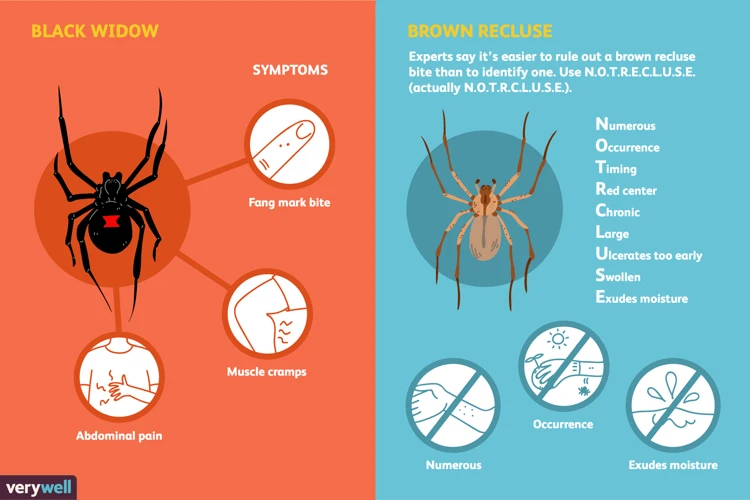As we go about our daily lives, we may come into contact with various insects, including spiders. While most spider bites are harmless, some can be venomous, such as the black widow spider. The thought of being bitten by a black widow spider can be quite unsettling, and many people may wonder what to do in such a situation. This article will provide a comprehensive guide on when to seek medical attention for a black widow spider bite, as well as tips on how to prevent it from happening. So, let’s dive in and learn more about this potentially dangerous spider.
Signs and Symptoms of Black Widow Spider Bite
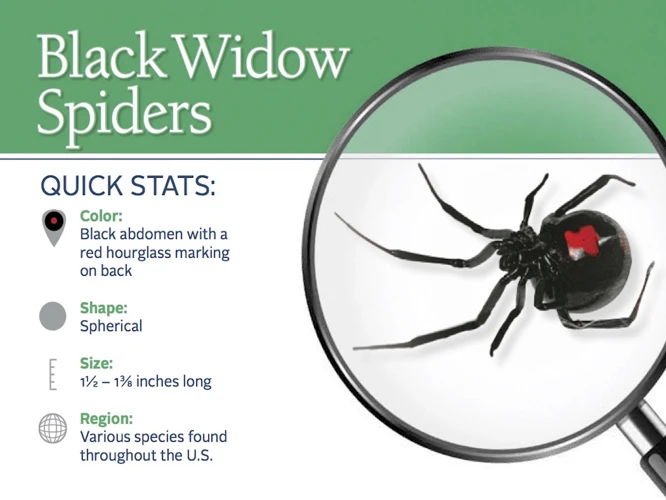
The signs and symptoms of a black widow spider bite can be alarming and may cause significant discomfort. It is important to recognize the symptoms as early as possible so that you can seek medical attention promptly. Localized symptoms at the site of the bite can range from mild to severe, while systemic symptoms can affect the entire body. Knowing how to identify these symptoms and when to take action is crucial. In this article, we have outlined the common signs and symptoms of a black widow spider bite to help you understand what to look out for.
Localized Symptoms
Black Widow Spider Bite can cause localized symptoms, which means that the symptoms appear where the bite occurs. The symptoms typically occur within the first hour after the bite, although it may take several hours before they start to manifest. Here are some of the localized symptoms that you may experience after being bitten by a Black Widow Spider:
- Immediate pain at the site of the bite
- Swelling and redness around the bite
- Muscle cramps and spasms
- Intense itching
- Stiffness and weakness in the affected muscles
If you experience any of these symptoms after being bitten by a Black Widow Spider, you should seek medical attention immediately. In some cases, people may also develop systemic symptoms, which can be life-threatening if left untreated.
Systemic Symptoms
Systemic symptoms of a black widow spider bite can begin to manifest within a few hours or up to a few days. They affect the entire body and can be severe or life-threatening. Here is a table outlining some of the most common systemic symptoms associated with a black widow spider bite.
| Symptom | Description |
|---|---|
| Abdominal cramps | Severe pain or discomfort in the abdomen area is common, and can spread to the chest and back. |
| Nausea and vomiting | Feeling sick to the stomach and throwing up are among the chief systemic symptoms. |
| Headache | A dull or intense pain in the head can occur as the venom spreads through the body. |
| Sweating | Excessive sweating is another common systemic symptom. Some people may break out in a sweat regardless of the ambient temperature. |
| Fever | A rise in body temperature can indicate a systemic reaction to black widow spider venom. |
| High blood pressure | Some people may experience a significant increase in blood pressure due to a black widow spider bite. |
| Restlessness and anxiety | Feeling agitated or anxious may occur as a victim’s body reacts to the venom. |
It’s important to note that systemic symptoms do not manifest in every case of a black widow spider bite. Some people may experience only localized symptoms without any systemic reaction. However, if you are experiencing any of the above systemic symptoms after being bitten by a black widow spider, seek medical attention immediately.
If you want to learn more about how to provide first aid treatment for a black widow spider bite, check out our article on first aid for black widow spider bites.
When to Seek Medical Attention
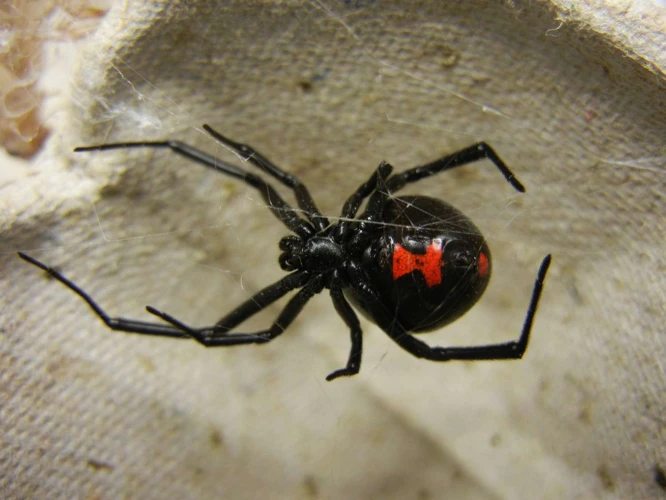
It can be difficult to determine when to seek medical attention after a black widow spider bite. While some bites may only result in mild symptoms that can be treated at home, others can lead to serious and potentially life-threatening complications. It’s important to know the signs and symptoms of a black widow spider bite and when to seek professional medical help. In some cases, immediate medical attention may be necessary to prevent severe health complications. Let’s take a closer look at what you should be aware of.
Adults
When it comes to black widow spider bites in adults, it’s important to know when to seek medical attention. While most adult bites are not life-threatening, some can be serious, and early treatment is essential. Symptoms of a black widow spider bite in adults can include both localized and systemic symptoms.
Localized Symptoms: After being bitten by a black widow spider, adults may experience localized symptoms that include sharp pain, swelling, and redness around the bite area. The bite may also appear as two puncture marks on the skin that are about 1 cm apart. These symptoms may develop within a few hours of the bite and can last for several days. If the bite is left untreated, it may develop into an open sore or ulcer.
Systemic Symptoms: In some cases, a black widow spider bite can cause systemic symptoms that can be life-threatening. Adults may experience symptoms such as muscle cramps, abdominal pain, and difficulty breathing. These symptoms can become severe quickly, and immediate medical attention is necessary.
If an adult is bitten by a black widow spider, it’s important to seek medical attention immediately if any of the following symptoms occur:
- Systemic symptoms: If the person experiences muscle cramps, abdominal pain, or difficulty breathing, they should seek immediate medical attention.
- Severe localized symptoms: If swelling and redness around the bite area become severe and spread quickly, they should seek medical attention.
- Progressive symptoms: If the person experiences any of the above symptoms and they worsen over time, they should seek medical attention immediately.
It’s important to note that some people may have an allergic reaction to a black widow spider bite, and this can make symptoms worse. If an adult has a history of severe allergic reactions, they should seek medical attention as soon as possible.
In the meantime, there are some first aid measures that can be taken to alleviate symptoms. Applying a cold compress to the bite area can help alleviate pain and swelling. It’s important not to apply heat to the area as this can exacerbate symptoms.
Remember, seeking medical attention as soon as possible is key to preventing serious complications from a black widow spider bite in adults. For more information on natural remedies and medical treatments for black widow spider bites, check out our article.
Children
Children are particularly vulnerable to black widow spider bites because of their smaller body mass. They may experience more severe symptoms than adults, so it’s important to seek medical attention immediately if you suspect your child has been bitten by a black widow spider.
Here is a table to help you determine when to seek medical attention for a black widow spider bite in children:
| Severity of Bite | Symptoms | Action |
|---|---|---|
| Mild Bite | Localized symptoms such as redness, pain, swelling, and stiffness in the area of the bite | Apply a cool compress to the bite area and monitor the child for systemic symptoms. If symptoms worsen or persist beyond a few hours, seek medical attention. |
| Moderate Bite | Localized symptoms that worsen, including severe pain, muscle cramps, and spasms | Seek medical attention immediately. Do not wait for symptoms to worsen or spread to other parts of the body. |
| Severe Bite | Systemic symptoms such as abdominal cramps, nausea and vomiting, chest pain, high blood pressure, tremors, seizures, and difficulty breathing | Call 911 or go to the nearest emergency room immediately. A severe black widow spider bite is a medical emergency and requires immediate treatment. |
Remember that children may not be able to communicate their symptoms as effectively as adults, so it’s important to observe them closely and seek medical attention if you suspect they have been bitten by a black widow spider.
To learn more about first aid and medical treatment for black widow spider bites, check out our article on How to Treat a Black Widow Spider Bite.
First Aid Treatment for Black Widow Spider Bite
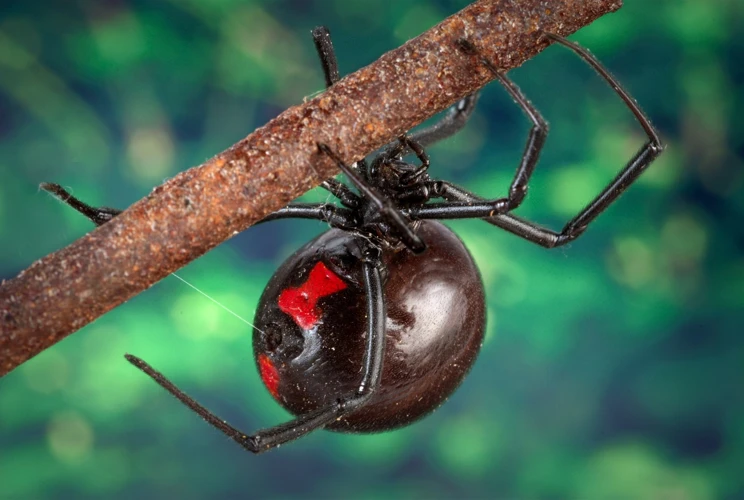
In the event of a black widow spider bite, immediate first aid treatment is crucial to reduce the severity of the symptoms and prevent further complications. It’s important to act quickly, but also to know what to do and what not to do. The right first aid measures can make a big difference in helping you recover faster. In this section, we’ll outline the recommended first aid steps in case you or someone near you gets bitten by a black widow spider. Remember, if you’re uncertain about the severity of the bite or the symptoms become worse, seek medical attention immediately. Let’s explore the first aid treatment for black widow spider bite. If you want to learn more about steps to avoid getting bitten by black widow, read our article “How to Avoid Black Widow Spider Bites”.
What to do Immediately
In case of a black widow spider bite, taking immediate action is crucial in managing the symptoms and preventing further complications. Here are the steps that you should take immediately after being bitten:
| Step 1: | Wash the affected area with soap and water. |
| Step 2: | Apply a cool compress on the bite to alleviate pain and inflammation. |
| Step 3: | Keep the affected limb elevated to slow down the spread of venom. |
| Step 4: | Take over-the-counter pain relievers such as acetaminophen or ibuprofen to manage pain. |
| Step 5: | Seek medical attention immediately if you experience any systemic symptoms such as difficulty breathing, muscle cramps, and elevated heart rate. |
It is important to note that these steps are intended to alleviate pain and manage local symptoms. Seeking professional medical attention is still necessary to prevent the worsening of systemic symptoms, especially among high-risk individuals such as children and elderly people.
Also, keep in mind that not all bites from black widow spiders require medical attention. Some bites may only cause localized symptoms that can be managed through first-aid treatment. However, if you are unsure about the severity of your symptoms, it is always best to consult a medical professional to get proper assessment and treatment.
What not to do
It is important to know what not to do when it comes to treating a black widow spider bite to avoid making the situation worse. Do not apply ice or a cold compress, as this can worsen the pain and cause more damage to the affected area. Do not use a tourniquet, as this can cut off circulation and cause further harm to the body. Do not attempt to suck out the venom, as this can lead to infection and other issues.
It is also important to avoid taking any medications without consulting a medical professional first. Some drugs can interfere with the body’s response to the venom and exacerbate symptoms. Additionally, do not attempt to cut or puncture the wound in an effort to drain the venom, as this can increase the risk of infection.
Even if the symptoms of a black widow spider bite are mild, it is crucial to seek medical attention as soon as possible. Delaying treatment can increase the risk of complications and slow the recovery process. In the next section, we will discuss the medical treatments that can be used to help alleviate symptoms and promote healing after a black widow spider bite. If you want to learn more about the symptoms of a black widow spider bite, please check our detailed article about black widow spider bites.
Medical Treatment for Black Widow Spider Bite
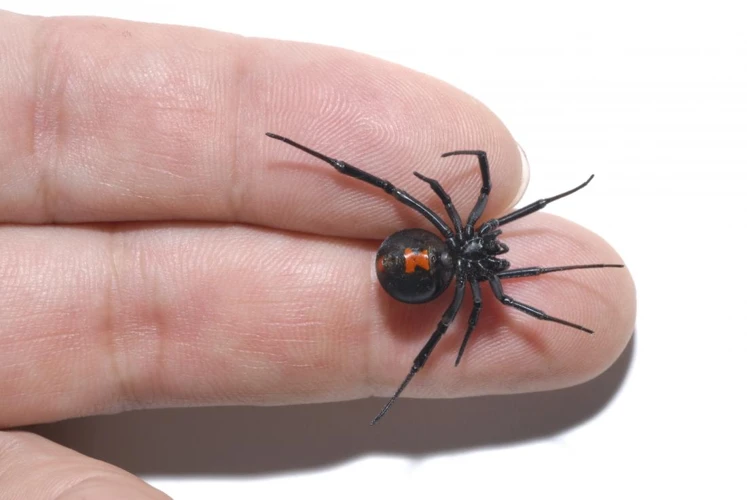
After experiencing a black widow spider bite, seeking medical attention is crucial in managing the symptoms and preventing further complications. While first aid treatment can help alleviate the pain and reduce the severity of the bite, medical treatment may be necessary for severe cases. The medical treatment for black widow spider bite typically involves antivenom, antibiotics, and pain management. In this section, we will discuss the different medical treatments available for black widow spider bites and how they can help patients recover. We will also provide tips on how to prevent black widow spider bites from occurring in the first place. For more information on emerging treatments for black widow spider bites, visit our previous article on emerging treatments for black widow spider bites.
Antivenom and Antibiotics
When it comes to treating a black widow spider bite, antivenom and antibiotics may be prescribed by a medical professional. Antivenom is a rare substance that is created by milking venom from black widow spider s, which is then processed to create an antivenom medication.
Antivenom:
Antivenom works to neutralize the spider’s venom, which can help alleviate symptoms and even prevent more serious complications. However, it is not always necessary, and its use depends on the severity of the bite and the patient’s overall health. Antivenom is typically reserved for those who experience severe symptoms, such as muscle rigidity, seizures, or difficulty breathing.
Antibiotics:
Antibiotics may also be prescribed by a doctor to help prevent infection from occurring. Antibiotics work by killing bacteria in the body, which can reduce the risk of complications. These are usually prescribed if a person has an open wound or if their immune system is compromised.
Below is a table summarizing the use of antivenom and antibiotics in treating black widow spider bites.
| Antivenom | Antibiotics | |
|---|---|---|
| Use | Used to neutralize spider’s venom | Used to prevent infection from occurring |
| Severity | Typically reserved for severe symptoms | Usually prescribed if open wound or immune system is compromised |
| Side Effects | May cause allergic reaction | May cause side effects such as diarrhea, nausea, and rash |
It is important to note that the use of antivenom and antibiotics is at the discretion of the medical professional, and they will consider the patient’s individual health history and symptoms before prescribing any medication. Recovering from a black widow spider bite can take several days to a couple of weeks, and it is important to follow any post-treatment instructions provided by your healthcare provider to ensure a full recovery. Gentle hot compress on the bite can effectively relieve pain and itching, as well as prevent secondary infections. Pro-Compress is a great option for hot compress.
Pain Management and Other Medications
Pain management is an essential aspect of treating black widow spider bites. Pain relievers such as acetaminophen, ibuprofen, and naproxen sodium can help alleviate the discomfort caused by the bite. In severe cases, doctors may prescribe stronger pain medications such as opioids.
Antihistamines can also be used to relieve itching and swelling associated with the bite. These medications work by blocking the effects of histamine, a chemical released by the body in response to an injury or allergen.
In some cases, corticosteroids may be prescribed to help reduce inflammation and swelling. These medications can also help alleviate pain.
If the bite has become infected, antibiotics may be necessary to treat the infection. These medications work by killing or slowing the growth of bacteria that are causing the infection.
It is important to note that not all pain medications are suitable for everyone. Patients should always consult with a healthcare professional before taking any prescription or over-the-counter medications.
In addition to medications, other pain management techniques may be recommended by a doctor to help alleviate discomfort caused by the bite. These techniques include:
- Applying a cool compress to the bite
- Elevating the affected limb or area
- Resting the affected limb or area
- Engaging in relaxation techniques such as deep breathing or meditation
Following these pain management techniques and taking prescribed medications as directed can help patients recover from a black widow spider bite more quickly. It is also important to follow up regularly with a healthcare provider to ensure proper healing and recovery. For more information about black widow spider bite recovery, click here.
Preventing Black Widow Spider Bites
One of the most effective ways to prevent black widow spider bites is to take proactive measures that will reduce the likelihood of encountering these spiders in the first place. By using common sense and being aware of your surroundings, you can minimize your risk of getting bitten. In this section, we’ll look at some practical steps you can take to avoid black widow spider bites and how to keep them away from your home. So, let’s dive in and learn how to protect yourself and your family from these dangerous spiders.
How to Avoid Black Widow Spiders
One effective way to prevent encountering black widow spiders is to take preventative measures to avoid areas where they commonly reside. Black widow spiders typically live in dry, sheltered areas such as woodpiles, garages, and sheds. Here are some tips to avoid black widow spiders:
| Tip | Description |
|---|---|
| Wear protective clothing | Wear thick gloves and long-sleeved shirts when working outside or in areas where black widow spiders may reside. |
| Watch where you step | When walking outside, watch where you step and avoid walking through piles of wood or other debris. |
| Check your surroundings | Before reaching into any dark crevices or spaces, visually inspect the area for black widow spiders or webs. |
| Be cautious | Avoid provoking or disturbing black widow spiders and their webs. They may bite if they feel threatened. |
| Clean your surroundings | Frequently remove debris and clutter from your yard or outdoor areas, especially in areas where you spend a lot of time. |
By being aware of where black widow spiders typically reside and taking preventative measures, you can minimize your chances of encountering them and avoid black widow spider bites. Remember, it’s always better to be safe than sorry when it comes to your health and wellbeing.
How to Keep Black Widow Spiders Away from Your Home
Keeping black widow spiders away from your home is an important step in preventing bites. Here are some tips to consider:
| Tip | Description |
|---|---|
| Seal cracks and crevices | Black widow spiders can slip through the tiniest openings, so seal any cracks or crevices in your home’s foundation, walls, and windows with caulk or weather stripping. |
| Clear away clutter | Black widow spiders enjoy hiding in clutter, so keeping your home tidy can minimize their hiding spots. Regularly clean and declutter your basement, garage, and other storage areas. |
| Reduce outdoor lighting | Black widow spiders are attracted to light, so reduce outdoor lighting or use yellow bulbs that are less attractive to insects. This can also help reduce the number of insects that attract black widows to your home. |
| Trim vegetation | Black widow spiders like to hide in vegetation, so trim trees, bushes, and other plants away from your home’s exterior. Keep your grass and shrubs trimmed and avoid stacking firewood or other materials against your home. |
| Use spider repellents | There are various types of spider repellents, including natural options like peppermint oil or vinegar, or chemical sprays and traps. Consider using spider repellents at entry points to your home or in areas where you’ve seen black widow spiders. |
By taking these steps, you can reduce the likelihood of black widow spiders inhabiting your home and decrease your risk of being bitten.
Conclusion
In conclusion, it’s important to take black widow spider bites seriously as they can cause potentially life-threatening symptoms. Remember, prevention is key in avoiding a black widow spider bite. Take necessary precautions when working in wooded or outdoor areas, and check your surroundings before sitting or placing your hands on any surfaces. If you do get bitten, seek medical attention immediately, especially if you experience any systemic symptoms such as muscle pain, weakness, or difficulty breathing. First aid treatment can help alleviate localized symptoms, but should not serve as a substitute for professional medical care. With proper medical treatment, most individuals make a full recovery from black widow spider bites. Stay safe and be aware of your surroundings to protect yourself from these venomous spiders.
Frequently Asked Questions
Can a black widow spider bite kill you?
Yes, although deaths from black widow spider bites are rare, they can be fatal, especially in young children, the elderly, and those with compromised immune systems.
How do I know if a spider is a black widow?
The black widow spider is black with a distinctive red hourglass-shaped mark on the underside of its abdomen. Females are larger than males and have a shiny, round abdomen.
Where are black widow spiders commonly found?
Black widow spiders are commonly found in North and South America. They prefer warm and dry environments and are often found in woodpiles, trash cans, and other secluded areas.
Do all black widow spider bites require medical attention?
No, not all black widow spider bites require medical attention. However, it is recommended to seek medical attention if you experience severe symptoms or if you are at high risk of developing complications.
What is the first aid treatment for a black widow spider bite?
First aid treatment for a black widow spider bite includes cleaning the wound, applying a cool compress, and taking over-the-counter pain medications as directed by a healthcare professional.
Can I prevent black widow spider bites?
Yes, you can prevent black widow spider bites by avoiding contact with spiders, wearing protective clothing, and keeping your home clean and free of clutter.
What is the medical treatment for a black widow spider bite?
Medical treatment for a black widow spider bite may include antivenom, antibiotics, and pain management medications. The specific treatment will depend on the severity of the symptoms.
How long does it take to recover from a black widow spider bite?
Recovery time from a black widow spider bite varies depending on the severity of the symptoms. Mild symptoms may improve within a few days, while severe symptoms may take several weeks to improve.
Can I die from a black widow spider bite if left untreated?
Yes, in some cases, a black widow spider bite can be fatal if left untreated, especially in high-risk groups such as young children, the elderly, and those with compromised immune systems.
What should I do if I suspect I have been bitten by a black widow spider?
If you suspect you have been bitten by a black widow spider, seek medical attention immediately, especially if you experience severe symptoms such as difficulty breathing or loss of consciousness.

